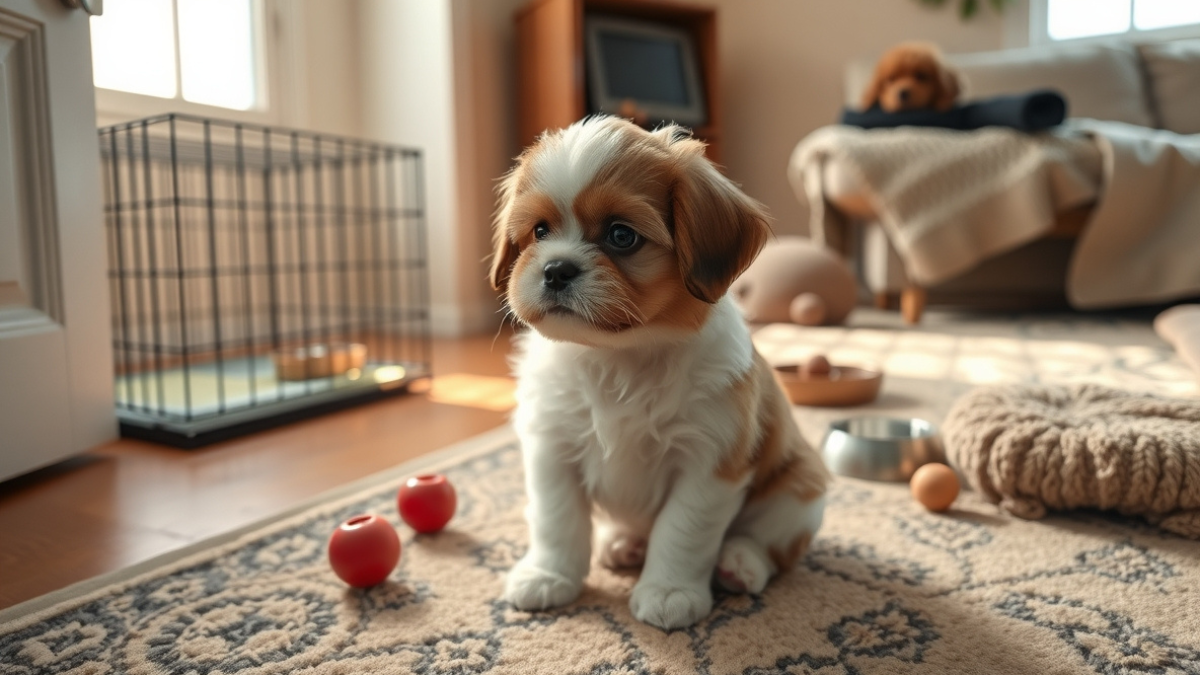Can You Leave a Shih Tzu Puppy Alone at Home? Here’s What Vets Say

Shih Tzus are known for their adorable looks, affectionate nature, and deep attachment to their human families. As companion dogs, they are bred to stay close to people and are not naturally inclined to enjoy solitude. So when new Shih Tzu owners ask, “Can I leave my Shih Tzu puppy alone at home?” — the answer is more complex than a simple yes or no. Understanding this breed’s temperament and developmental needs is key to answering that question responsibly.
What does “Can Shih Tzu puppies be left alone?” mean?
This question revolves around the dog’s emotional resilience, behavior management, and overall well-being when left without human presence. It includes concerns about how long puppies can be left alone, at what age it becomes acceptable, and how to avoid issues like separation anxiety. It’s not just about physical safety but about emotional comfort and behavioral development.
Shih Tzu personality and behavior
Bred originally to serve as lap dogs for Chinese nobility, Shih Tzus are not your average independent breed. They crave closeness, enjoy cuddles, and follow their owners around like shadows. This constant desire for companionship makes them more susceptible to stress and anxiety when left alone, especially during their puppy phase.
Age matters when it comes to alone time
Veterinarians strongly advise against leaving very young puppies — especially those under 12 weeks old — alone for more than an hour or two. At this stage, they are still forming emotional bonds, adjusting to their new environment, and undergoing house training. Alone time beyond their capacity can lead to confusion and stress. As they grow older, specifically after six months, their tolerance improves slightly, but caution is still necessary.
How long is too long?
The general guideline for leaving puppies alone is based on their age in months. A common formula is: for every month of age, they can tolerate about one hour alone. So, a 3-month-old Shih Tzu may manage about 3 hours. However, many vets suggest capping this at 4 hours for young puppies, even as they grow, due to their emotional dependence. Adult Shih Tzus might manage 6 hours, but they still prefer company.
Common signs your puppy isn’t coping well
If your Shih Tzu starts displaying behaviors like excessive barking, indoor accidents despite training, destructive chewing, or pacing, it might be a sign of separation anxiety. These symptoms show emotional distress and shouldn’t be ignored. Left unaddressed, they can lead to more serious behavioral problems down the road.
Veterinary opinions on puppy loneliness
Veterinarians often stress that behavioral patterns formed during early puppyhood can have lasting effects. Puppies left alone too early or too long might develop chronic anxiety. They emphasize the importance of gradual separation training, building confidence in the puppy to handle time alone. Vets also note that overstimulated or under-socialized puppies can develop aggressive tendencies or become overly fearful.
Helping your Shih Tzu puppy adjust to being alone
If you’re preparing your Shih Tzu puppy to spend some time alone, start small. Begin with leaving them alone for 10 to 15 minutes. Use that time to observe their reaction through a pet cam or by checking signs upon your return. Increase this time slowly over days or weeks. This gradual exposure helps desensitize them to the feeling of being alone.
Crate training and confined spaces
Shih Tzus often feel safer in small, cozy spaces. A crate, when introduced positively, becomes a safe zone for them. It also helps with potty training and limits destructive behavior. The key is to never use the crate as punishment. Instead, make it comfortable with soft bedding, a familiar blanket, and a favorite toy. Crates should always be used responsibly and for short durations during early training.
The role of mental stimulation
Interactive toys, puzzle feeders, and slow-dispensing treat toys can keep your Shih Tzu puppy engaged during your absence. Mental stimulation is just as important as physical exercise for this breed. It keeps them focused, reduces boredom, and prevents the development of anxiety-based habits like barking or pacing.
The importance of background noise
Some puppies find comfort in low, consistent background noise. Leaving a TV or radio on can mimic human presence and offer reassurance. While it’s no replacement for real companionship, it does help reduce complete silence that might trigger stress.
Avoid dramatic goodbyes and returns
Your puppy takes emotional cues from you. Making a big deal of leaving or returning home can cause excitement and anxiety spikes. Keep departures calm and brief, and act normally when you return. This conditions your puppy to see alone time as part of a normal routine.
Alternatives when you’re away too long
If your schedule requires you to be out for more than 4 hours, it’s best to look into alternatives. A dog walker, trusted friend, or professional pet sitter can fill in the gap. Doggy daycare, while not necessary for every day, can also offer great socialization and stimulation opportunities.
Can a Shih Tzu puppy be left overnight?
No, puppies under 6 months should not be left alone overnight. They need regular feeding, potty breaks, and reassurance. Leaving them alone for such extended hours can be traumatic and cause setbacks in training and trust. Older, well-trained dogs might handle this better, but even then, it is not ideal for a Shih Tzu.
Benefits of teaching independence early
Training your Shih Tzu puppy to be comfortable while alone has long-term advantages. It reduces dependence, builds confidence, and ensures they’re not overly clingy. It also prepares them for future situations like vet visits, boarding, or being cared for by others.
Is having another pet helpful?
In some cases, having another dog or even a cat can help ease loneliness, but this varies by personality. Some Shih Tzus bond well with other animals, while others might still crave their human’s presence. If you go this route, introduce the new pet slowly and ensure both are well-socialized.
Conclusion
Leaving a Shih Tzu puppy alone at home isn’t impossible, but it requires intentional planning, patience, and empathy. It’s not just about keeping them safe; it’s about ensuring they feel secure, loved, and emotionally healthy. With the right preparation, short durations of alone time can become a normal and manageable part of your puppy’s day.
The key takeaway? Always go at your puppy’s pace. With love, consistency, and a thoughtful approach, your Shih Tzu can learn to spend time alone without fear or stress.
Help your Shih Tzu thrive—even when you’re not home.




